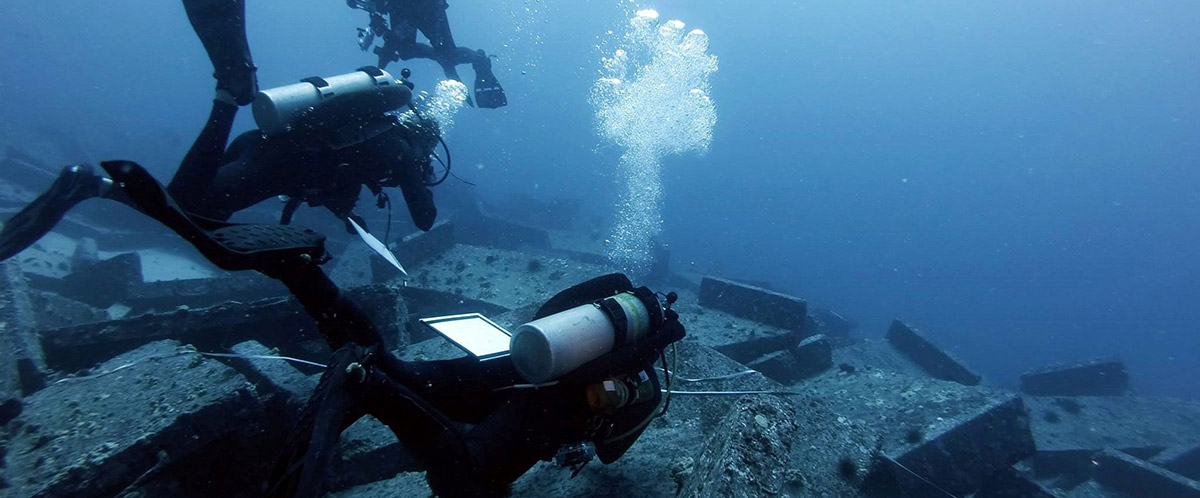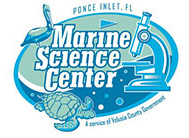RESEARCH

COOPERATIVE MARINE TURTLE TAGGING PROGRAM
Sea turtles that are treated and released from the Marine Science Center receive tracking tags as part of the Cooperative Marine Turtle Tagging Program. This international effort is coordinated through the Archie Carr Center for Sea Turtle Research at the University of Florida. All turtles that are large enough are tagged with flipper identification numbers and an electronic identification chip (sometimes referred to as a microchip). If turtles are discovered with these tags in the future, their history can be traced and vital information about migration, growth, survival and other data can be shared to help promote sea turtle conservation around the world.
ARTIFICIAL REEF SURVEYS
The Marine Science Center works closely with the Volusia County Reef Research dive team to assist the Ponce Inlet and Port District in developing and protecting the county's permitted artificial reefs. The Dive Team consists of volunteer divers who complete surveys of local artificial natural reefs and natural reefs for comparison. Volusia County Reef Research
LESSER BLACK BACK GULL BANDING
Once a rare stray to North America, the lesser black back gull, a European gull, has become a common visitor to North America’s east coast. Thousands are found every winter (with smaller numbers at other seasons), mainly along the Atlantic Coast south to Florida and inland to the Great Lakes, but with smaller numbers across the continent. Little is known about the migratory patterns of these Florida visitors, so the Marine Science Center has partnered on a project to place indentifying leg bands on some individuals. Researchers learn more about the biology of gulls as tagged animals are spotted along the Atlantic coast of North America. This research relies on people like you - birders, beachgoers and casual observers - to report banded birds. If you see a banded bird, please record the color of the band, the color of the code, the code, which leg the band was on, the location where you saw it, and the date. You can report a Banded Bird online, or by calling 1-800-327-2263
MIGRATORY BIRD (WARBLER) TRACKING TOWER
The MSC and Beach Safety have partnered with the Smithsonian Institute and U.S. Fish and Wildlife Service to track one of the rarest birds in the United States. The Kirtland’s warbler is one of the most endangered bird species and migrates yearly between their wintering grounds in the Bahamas and breeding areas in northern Michigan. Ponce Inlet was deemed an important southernmost link in a chain of monitoring stations to detect the warblers as they migrate from the Bahamas to Michigan and back again. For this reason, the Smithsonian has installed a monitoring antenna on the Lifeguard Station at Ponce de Leon Inlet. This station is one of 10 along the Atlantic Coast from Volusia County to the Georgia border. The listening devices are part of the Motus Wildlife Tracking System, which comprises a network of coordinated radio towers that track animals wearing a digital “nanotag” tracking device. Working directly with the Smithsonian Institute, Marine Science Center staff downloads data on the pings transmitted from the tag to the radio antennae. The antenna also picks up other important migratory birds and bats that are wearing the transmitter. This detailed information can then be used to track the migrations of these animals and further detail critical habitat key to the survival of these species.
SHOREBIRD NESTING SURVEYS
Volusia County and the Marine Science Center are active members of the Florida Shorebird Alliance. This partnership is a countywide alliance of interested groups, organizations and individuals committed to advancing shorebird and seabird stewardship in Volusia County. The partnership has evolved to allow us to conduct monthly shorebird surveys, including winter surveys of piping plover critical habitat of Florida and additional known habitat in and around Ponce Inlet. We hope this long-term data set will be used in future management decisions to improve habitat and protection for shorebirds in Volusia County.
PELAGIC BIRD TRIPS
The Friends of the Marine Science Center sponsors pelagic birding trips that offer exploration off the east coast of Florida. These expeditions explore the Gulf Stream up to 50 miles offshore onboard the Canaveral Princess, an 85-foot boat with excellent observation areas on the upper deck. The trips leave from Port Canaveral, and travel out 50 miles into the center of the Gulf Stream. These trips hold high probability of encountering numerous pelagic species. Plan your pelagic adventure

 DONATIONS
DONATIONS


